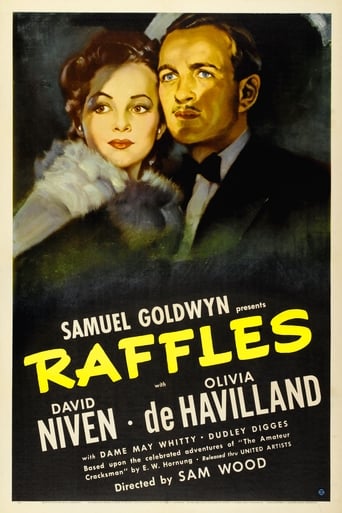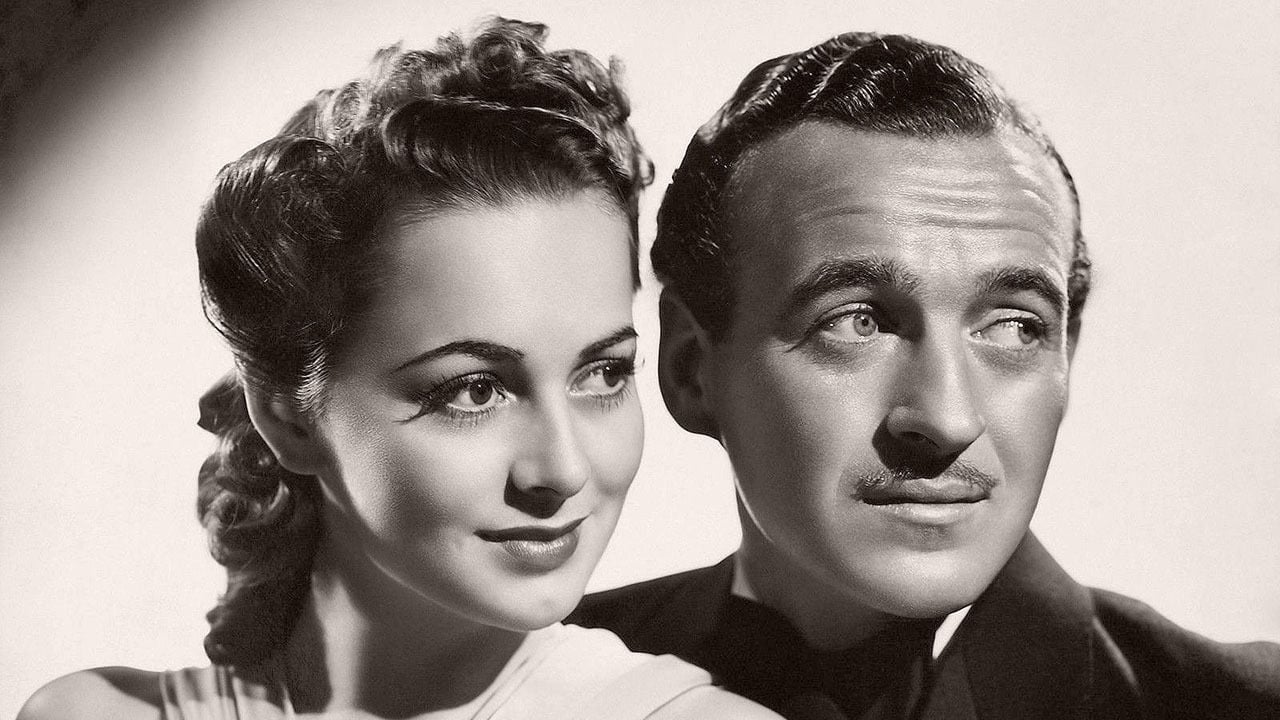JohnHowardReid
Producer: Sam Goldwyn. Copyright 24 January 1940 by Samuel Goldwyn. Released through United Artists. Presented by Samuel Goldwyn. New York opening at the Roxy: 12 January 1940. Australian release: 2 May 1940. 8 reels. 6,444 feet. 71½ minutes. SYNOPSIS: Social cricketer takes up jewel thieving for fun and profit.NOTES: William Wyler directed the cricket scenes. F. Scott Fitzgerald also worked on the script, but contributed little of significance.COMMENT: Ernest William Hornung was Sir Arthur Conan Doyle's brother-in-law. What more natural than that he should pen a rival series of stories featuring a thief instead of a detective? Like Sherlock Holmes, these stories were originally published in a monthly periodical. Like Sherlock, they are narrated in the first person by an accomplice of the principal character. There, unfortunately, the similarity stops. Hornung's writing style is always bland and often long-winded, his characterization weak and his dialogue dull. The plots have little sting and are often resolved by a most disappointing let-down.His first book collection, entitled simply Raffles (1899), contains fourteen short stories. The first eight were part of the original magazine series. The remaining six form a "Return of Raffles". The film script doesn't touch upon any of these last six stories at all. Instead it is largely based upon the two stories that are connected: "Gentlemen and Players" and its sequel, "The Return Match", plus a substantial part of "The Ides of March" and a single, chance idea from "Nine Points of the Law". (The most exciting story, "A Costume Piece" in which Raffles adopts some effective, Holmesian-style disguises is not used at all.)Howard and Van Druten have done a marvelous job combining these stories and the resulting film very faithfully reflects Hornung's original - right down to the weak climaxes. Of course the characterizations in the film - helped as they are by the endeavors of a first-rate cast - are far more exciting.Niven (in his first starring role) is exactly right for the true-blue sporting blood, A.J. Raffles. It's a role he was born to play and he loses not a single opportunity to be charming, witty and gallant on the one hand, roguish, twinkle-eyed and cunningly resourceful on the other. Miss de Havilland has little to do but look decoratively uncomfortable, while Dame May Whitty gives her usual vigor to a characteristically strident dowager. Dudley Digges has one of the film's meatiest parts which he puts over with such unsubtle insinuations as to compel attention even in his less dramatic scenes.Aside from Douglas Walton (who makes Bunny far too weak a character), the rest of the players led by Lionel Pape's Lord George are solidly supportive, although Peter Godfrey (soon to become a major director) overdoes the Cockney accent and mannerisms. His Crawshay (as written and played) is too much a caricature - a fault that is not found in the book.As we might expect from Sam Goldwyn, the film is immaculately produced. Photography, sets, costumes are most attractive. Wood stepped into the director's chair straight from his stint on Gone With The Wind. From all accounts, he was worn out. (William Wyler directed the cricket scenes when he was off ill for a few days). And Raffles looks like the work of a tired man. The direction is flat, straightforward and pedestrian. Not only are the camera angles persistently routine and unimaginative, but the pace is slow and the editing slack. The whole film lacks sparkle.And as for those weak climaxes! It's one thing to get the hero into those all-odds-against him situations, but we expect the writers to extricate him with a modicum of ingenuity. This, they signally fail to deliver.OTHER VIEWS: Slight, but entertaining and filmed with impeccable taste. As usual, producer Samuel Goldwyn has surrounded himself with the very finest writers, technicians and players. One couldn't help but make an enjoyable film with such a tower of talent! The acting especially is delightful, with Niven exactly right as the charming if rascally Raffles, while Dudley Digges, his watchful nemesis, burrs away with a hearty Scottish accent.
trimmerb1234
I'm an great admirer of the Raffles books. E W Hornung was a better writer than the more famous Arthur Conan Doyle, his more famous brother in law. The stories were very well constructed,characters well-defined and deserved classics. This is a thin lazy adaptation, combining of several of the stories losing a great deal of what was important. It is though a scene by scene and largely word for word re-make of the superior 1930 Ronald Colman version.One, and perhaps the, reason for the remake seemed obvious to me. The 1930 version was too steamy and too suggestive for 1939. When Ronald Colman courteously escorts the large and elderly Lady Melrose to her bedroom and wishes her goodnight, Lady Melrose affects to mishear and Colman repeats with great emphasis the finality of NIGHT!. It is made very clear from their expressions that Lady Melrose was hoping Colman would join her. It think it was not perhaps until the 1970s that Hollywood would again dare suggest such a thing. Colman's love interest is clearly passionately besotted with him and would do anything for him. It was realism but of a kind which Hollywood would I think never portray again. Firstly Hayes Code prudery and later the box office obligation to show women as heroic and independent.The adaptation removes Bunny's connection with Raffles (formerly a junior at Raffles public (fee paying) school and the odd obligations this entailed. Bunny in this version has little purpose. Raffles was the ultimate professional thief and corrupts Bunny and in the process teaches him (and the reader) his philosophy of life and crime. His cricket was a calculated necessary high profile front. Raffles lived alone without a servant - his night time arrivals and departures, often in disguise made that obligatoryAs other reviewers have said, Niven makes a good job of his part but only Olivia de Havillands loveliness makes the film at all watchable.The best screen rendering of the Raffles was a 1975 British TV series - again combining different stories but a seamlessly invisible adaptation. The interiors were those of a wealthy single gentleman of 1890s London - based on gentleman's clubs. Raffles, Bunny and McKenzie were authentically true to the books. It did Hornung honour. BBC Radio has done two versions (at least), first a reading and second a full production complete with distinctive signature tune.Thanks once again to Talking Pictures TV for screening these famous early Raffles versions. Otherwise I would never have known of them.
bkoganbing
In order to enjoy either version of Raffles, the Ronald Colman or this one, you have to be a fan of either Colman or David Niven in this case. If you don't like either, Raffles will not be your cup of English tea. Fortunately I like both of them.David Niven probably carried more films on his personal charm than any other player I know. Even more than Ronald Colman did, because Colman had the advantage of getting better scripts.This remake that Sam Goldwyn did of his own film had little change in it from the Colman version. David Niven is the debonair cricket player who has a nice sideline as a cat burglar. He's so good, he leaves taunting notes for Scotland Yard, particularly at Inspector Dudley Digges who's in charge of trying to catch him.The last job he does is for his friend Douglas Walton who has embezzled some mess company funds to gamble with and there's an audit come due. Raffles is a pal good and true and offers to help though Walton does not know about his sideline.Olivia DeHavilland is Walton's sister who has little to do but sit around and look beautiful. She had hoped that on the strength of her performance in Gone With the Wind, Warner Brothers would giver her more substantial material. That was not to be even on a loan out to Sam Goldwyn.Despite it being lightweight stuff, Raffles is a key film for David Niven. He was at last given first billing in a film. But as soon as the film was done, he was back to Great Britain to serve in the Armed Forces. Niven made two films in uniform, Spitfire and The Way Ahead, and also saw some combat. He wouldn't see Hollywood again for many years.Raffles is nice entertainment, but it helps to be a fan of David Niven.
MartinHafer
Wow, I was really underwhelmed by this film. Despite starring David Niven and Olivia de Havilland, this was an amazingly uninspired film. After all, the story is about a rich society thief who is a champion cricket player--you'd think there'd be more action and exotic or fashionable locales. But, instead, the film is very, very stagnant and the majority of the action (such as it is) takes place in a manor home where Raffles is staying along with a few other rich swells. It was so turgid, that at times I found myself falling asleep. I kept waiting and hoping for a fist fight or SOMETHING, but instead the film was very talky and all so well-mannered. A very uninspired script with an abrupt and senseless ending as well as lackluster direction conspired to keep this film in the category of 'mediocre', but it's still watchable due to the screen presence of its stars--especially the always lovely Miss de Havilland.


 AD
AD


